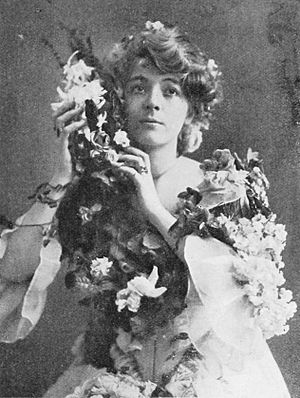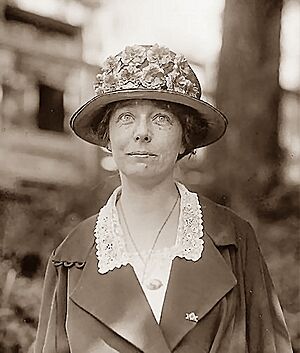Izetta Jewel facts for kids
Quick facts for kids
Izetta Jewel
|
|
|---|---|

Jewel c. 1903
|
|
| Born |
Izetta Jewel Kenney
November 24, 1883 Hackettstown, New Jersey, U.S.A.
|
| Died | November 14, 1978 (aged 94) La Jolla, California, U.S.A.
|
| Other names | Izetta Jewel Brown Izetta Jewel Miller |
| Occupation | Stage actress, politician, women's rights activist, radio personality |
| Spouse(s) | William Gay Brown Jr. (1914–1916; his death) Hugh Miller (1927–1965; his death) |
Izetta Jewel Kenney (born November 24, 1883 – died November 14, 1978) was an amazing American woman. She was a talented stage actress, a strong supporter of women's rights, and a politician. Izetta Jewel made history in 1924. She became the first woman to give a "seconding speech" for a presidential candidate at a major American political party meeting. This happened when she supported John W. Davis at the 1924 Democratic National Convention.
Contents
Early Life and Acting Career
Izetta Jewel Kenney was born in Hackettstown, New Jersey. Her father, Cornelius Cook Kenney, was a photographer. Her mother, Elizabeth Kenney, was an artist and an early supporter of women's rights. Izetta went to several schools, including the American Academy of Dramatic Arts in New York City. This is where she learned to act.
She started her professional acting career on May 14, 1900, in Wilmington, North Carolina. She was only 16 years old! Soon after, she got a chance to play a main role in an opera called Sapho. She then toured with different theater groups across the country.
In 1902, Izetta Jewel performed for over a year straight with the Castle Square Stock Company in Boston. She played many different characters, including roles in famous Shakespeare plays like The Merchant of Venice and Hamlet. People in Boston really liked her acting.
Later, she joined the Proctor Stock Company in New York City. She was praised for her roles in plays like If I Were King and The Prisoner of Zenda. After the big 1906 San Francisco earthquake, Izetta Jewel starred in the first play at San Francisco's new Colonial Theatre in 1906.
While acting in Portland, Oregon, she became very popular. She was even named the first Rose Queen of the new Portland Rose Festival!
Izetta Jewel made her big Broadway debut in New York City on January 3, 1910. She starred in a popular play called Your Humble Servant. She continued to act in many successful plays, often alongside famous actors of her time.
Family Life
Izetta Jewel stopped acting after she married Congressman William Gay Brown Jr. in 1914. He was a lawyer and a farmer from West Virginia. Sadly, he passed away in 1916, just a few weeks after their daughter, Izetta Jewel Gay Brown, was born. Izetta inherited a large amount of money from him.
She married again on April 16, 1927, to Hugh Miller. He was an engineering professor. Hugh Miller served in the U.S. Army during both World Wars.
Political Work and Women's Rights
Izetta Jewel was a strong advocate for women's rights. In 1921, she was part of a group of 50 women from the National Woman's Party (NWP). They met with President Warren G. Harding to ask for his help in ending unfair treatment against women. The NWP later made her one of their first members because of her hard work and support.
In 1922, Izetta Jewel became the first woman in the southern United States to run for the U.S. Senate. She almost won the Democratic Party nomination in West Virginia.
At the 1924 Democratic National Convention, Izetta Jewel gave a special speech. This was a "seconding speech," which means she spoke to support a presidential candidate. She was the first woman ever to give such a speech at a major national political convention! Her eight-minute speech for presidential candidate John W. Davis was very well received.
She also ran for Congress in New York in 1930 and for the New York Assembly in 1931, but she did not win those elections. In 1932 and 1933, she worked as the Commissioner of Public Welfare for Schenectady. During this time, she faced a legal issue related to her work.
In 1935, Izetta Jewel was given an important job. She became a Regional Director for the Works Progress Administration (WPA). The WPA was a government program that created jobs during the Great Depression. She oversaw projects for women in several states, including West Virginia and Pennsylvania.
Later Life and Achievements
After her first husband passed away, Izetta Jewel became known for raising purebred milk cows in West Virginia.
In 1928, she appeared in the first ever teleplay (a play made for television) broadcast in America! She played a Russian spy in a play called The Queen's Messenger.
Izetta Jewel was also a tireless supporter of the League of Nations, an organization that worked for world peace. She even met with the boy emperor Puyi in China and the Italian leader Benito Mussolini during a trip to Rome for a meeting about women's voting rights.
After World War II, Izetta and her husband moved to Southern California. There, she became a radio personality on a station in San Diego. In 1951, she was elected to the board of a new group called American Women in Radio and Television. In 1958, she was invited back to the Portland Rose Festival as a special guest to celebrate 50 years since she was crowned Rose Queen.
Izetta Jewel stayed active even when she was very old. She loved to swim daily in the ocean near her home in La Jolla. In her last years, she lived in a care center. On her 90th birthday, famous actors Helen Hayes and George C. Scott visited her. Helen Hayes had acted with Izetta when she was a child and always admired her.
Izetta Jewel passed away in La Jolla in 1978, at the age of 94.
 | Percy Lavon Julian |
 | Katherine Johnson |
 | George Washington Carver |
 | Annie Easley |


